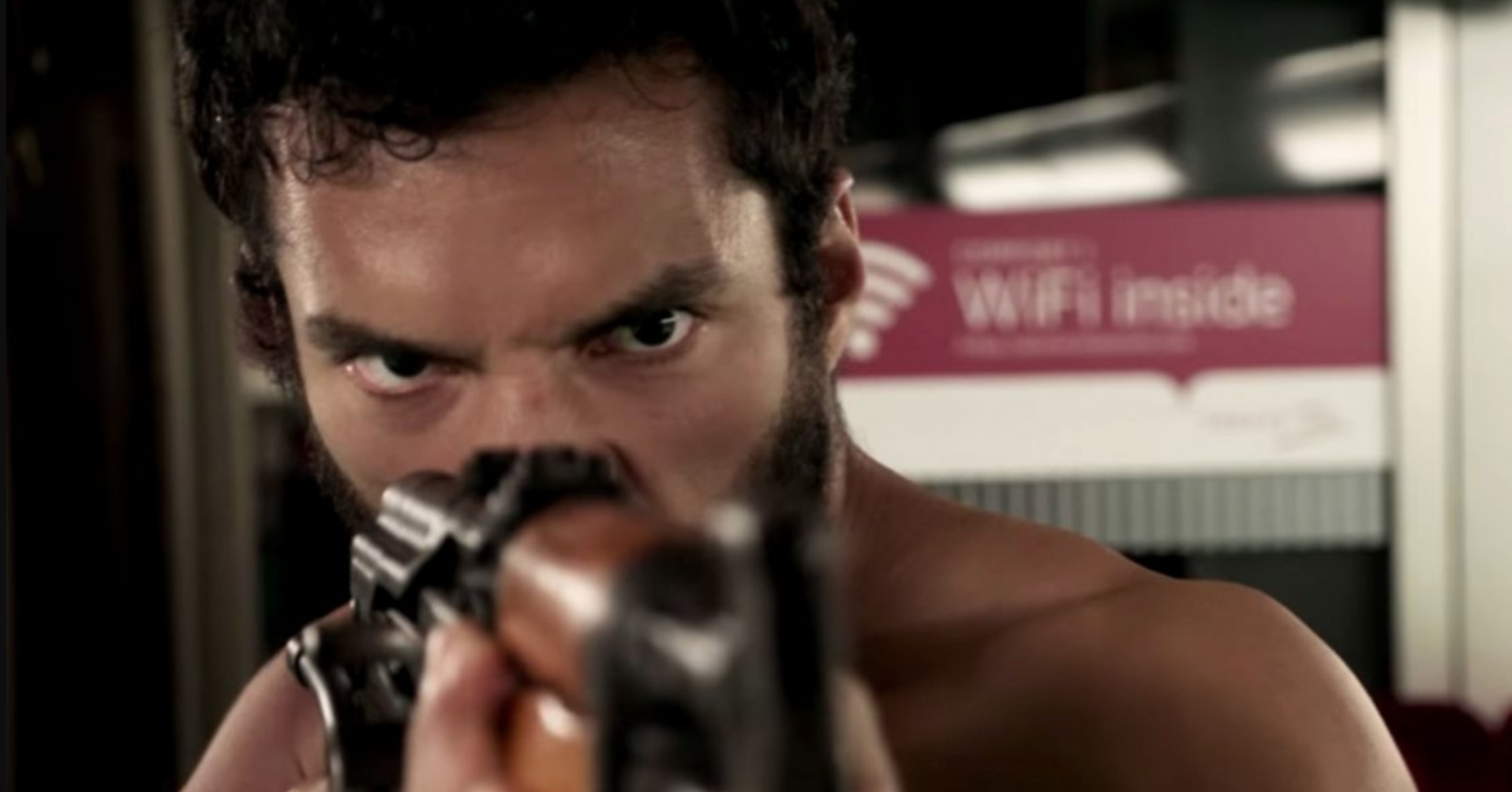Call me a wimp or a candy-ass but I’ve just deleted two posts about Jean-Pierre Jeunet‘s lament about a short sitting-down-dance sequence in Guillermo del Toro‘s The Shape of Water mirroring a similar sequence in Jeunet’s Delicatessen (’91). Too many people I trust and respect told me they thought it was dirty pool to bring it up. I didn’t “bring it up”, of course — Jeunet did in a French newspaper. I simply re-posted because Jeunet seemed (emphasis on the “s” word) to have a valid or at least an arguable point. When too many friends are frowning at you, a little red light goes on and you give things a re-think. So I let it go.
 Jeffrey Wells
Jeffrey Wells
Big Parade
A 2.6 Washington Post story says President Trump wants to stage a big, aggressive, Kim Jong-il– or Mussolini-like military parade down Pennsylvania Avenue. Trump was inspired by witnessing France’s military parade on Bastille Day, but the primary association is with authoritarian regimes looking to strut and sabre-rattle. A just-posted Slate piece says that “impromptu displays of military might are a sign of deep national weakness and insecurity.”
Kill The Colon
In what realm does a three-word title — Mission: Impossible — Fallout (Paramount, 7.27) — require a colon and a dash? For years I’ve been profoundly irritated by that absurd colon between Mission and Impossible. It was decided upon as a kind of macho symbol — a decisive mark or manly brand, two studly bullet holes — by TV series creator Bruce Geller.
Normally the noun would follow the adjective (i.e., impossible mission) but Geller switched them around. The colon was pointless, of course, but semi-tolerable, I suppose, as a stand-alone title of the CBS TV series (’66 to ’73). But when you add a franchise title (Fallout, Ghost Protocol, Rogue Nation) the marketers were obliged to add a dash, and it’s just not right.
At the very least all Mission: Impossible films, like the 007 series, are swoony travelogues. The following locations were used during filming of Mission: Impossible — Fallout: (1) Lysefjorden, Forsand, Norway, (2) Paris, France, (3) Brentwood, Essex, England, (4) Queenstown, New Zealand and (5) Blackfriars Bridge, London, England.
Funny Guy
If the Robespierre mob had miraculously mobilized its forces a half-century earlier, they could have put a stop to the destined-to-be demonic career of Woody Allen before anything bad could have happened. Life is really all about timing, isn’t it? I’m guessing that Allen’s Dean Martin Show appearance happened during season #1 (9.16.65 thru 5.5.66). Allen turned 30 on 12.1.65.
Red Chair
A major Santa Barbara Film Festival event happens tonight — Christopher Nolan, Greta Gerwig, Guillermo del Toro, Jordan Peele and Paul Thomas Anderson jointly receiving the Outstanding Directors of the Year award. Each will be interviewed separately by Hollywood Reporter awards columnist Scott Feinberg about, respectively, Dunkirk, Lady Bird, The Shape of Water, Get Out and Phantom Thread. If I had programmed this event Peele would be out and Call Me By Your Name‘s Luca Guadagnino would take his place.
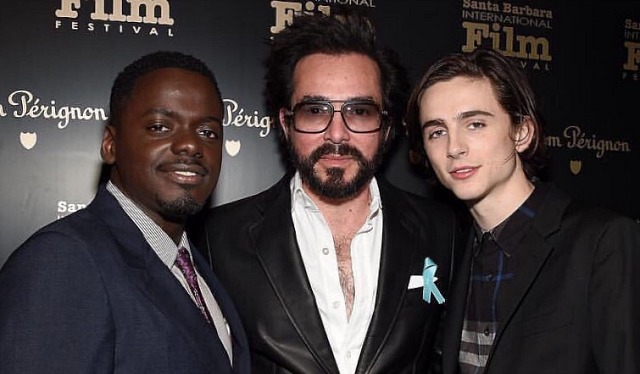
(l. to r.) Get Out‘s Daniel Kaluuya, Santa Barbara Film Festival director Roger Durling, Call Me By Your Name‘s Timothee Chalamet.
Proper Perspective
Atlantic critic David Sims posted a rave review of Sean Baker‘s The Florida Project on 10.5.17. He gave special props to Willem Dafoe‘s performance as Bobby, the ocasionally flustered but fair-minded proprietor of Orlando’s Magic Castle motel, in part by saying “it might be the finest role of Dafoe’s storied career.”
A24 marketers promptly made Sims’ quote sound more definitive by removing the “might be,” but they all remove modifiers.
It goes without saying that Dafoe’s lead performance in Martin Scorsese‘s The Last Temptation of Christ (’88) is far and away the finest of his career, not to mention his greatest role. There’s not even a debate about this…c’mon. Sims got carried away (as we all do from time to time) but he shouldn’t have even said “might,” which is the same as saying “possibly” or “arguably.” The “father, can you forgive me?” passage at the very end of Last Temptation blows Baker’s entire film to smithereens, and if Sims doesn’t know this he should.
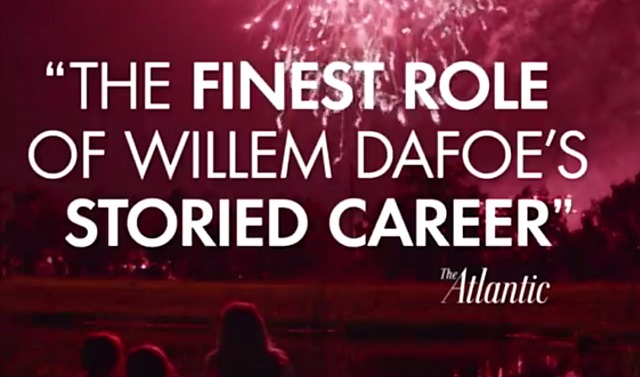
Critics Are Tip Toe-ing Around Black Panther Truth
On 1.31 I posted a qualified capsule rave of Ryan Coogler‘s Black Panther (Disney, 2.16). More precisely I raved about the final hour while lamenting that the first 75 minutes are largely lacking in narrative tension and are mostly about set-up, diversion, pageantry and obligatory battle and car-chase action sequences for their own sakes. All through the first hour-plus I was worried. I was asking myself “when is this film going to get it together and start moving purposefully in a direction that we all want it to go in?”
And then it finally does that, and it’s all exuberant, pedal-to-the-metal, forward-motion engagement. But you’ll need to scrutinize the recently-posted Black Panther reviews with a fine tooth comb to find even a hint of acknowledgment that it waits and waits and waits to really rev up the T-bird and put the rubber to the road.
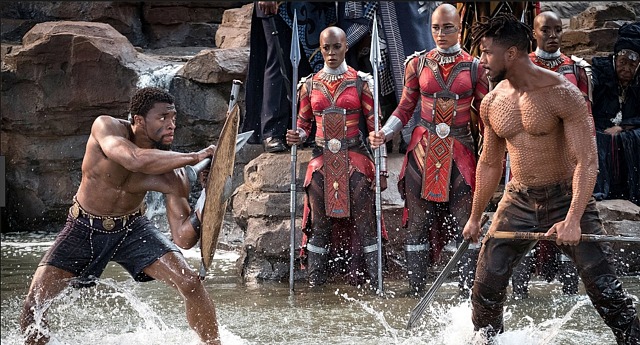
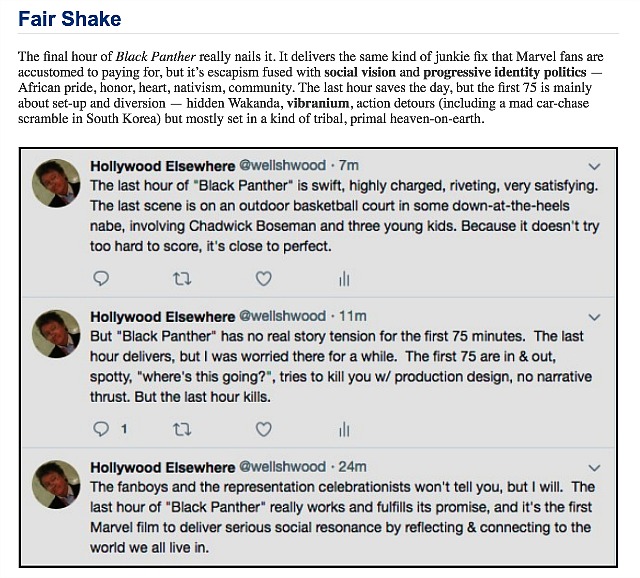
TheWrap‘s Alonso Duralde mentions “the film’s occasional pacing lapses” but calls them “forgivable.” Screen International‘s Tim Grierson allows that the story is “a little plodding.” The Playlist‘s Rodrigo Perez says that while certain “expounding preludes are flat and patchy, once Black Panther [finally] gets out of its crouching position and goes on a sprint, it’s an engaging ride that rarely lets up.”
Alluding to the faintly noddy, waiting-for-full-engagement section, Time‘s Stephanie Zacharek asks, “What would this film have been like if its action scenes had been cut cleanly and clearly, instead of chopped into the usual wasteful, visually confusing slice-and-dice mashup?”
See what I mean? They’re afraid to quibble or complain for the most part. They know Black Panther is going to be super-huge and they don’t want to seem as if they don’t get it or are in any way reluctant to celebrate this. Most critics are cowards. Have I been an occasional coward in the past? Yes. Have I ever sidestepped or diluted my real, deep-gut reactions to this or that film? I regrettably have from time to time. But so far I’m the only one to declare plain and straight that Black Panther, good as it ultimately is, doesn’t really get going until after the one-hour mark.
Tarantino’s Back In The Pit
A 15 year-old discussion about Roman Polanski‘s 1977 statutory rape episode has come back to bite Quentin Tarantino in the ass. The chat was between QT, Howard Stern and Robin Quivers, and of course was aired on Stern’s show. In early ’03 Tarantino’s remarks were obviously beyond the pale, but in today’s atmosphere…? Forget it.
Earlier this morning there were YouTube captures of the actual verbal discussion, but Sirius XM has had them removed. Here are portions from a Variety transcript:
Tarantino: “He didn’t rape a 13-year-old. It was statutory rape. That’s not quite the same thing. He had sex with a minor. That’s not rape. To me, when you use the word ‘rape,’ you’re talking about violent, throwing them down; it’s like one of the most violent crimes in the world. Throwing the word ‘rape’ around is like throwing the word ‘racist’ around. It doesn’t apply to everything that people use it for. He was guilty of having sex with a minor.”
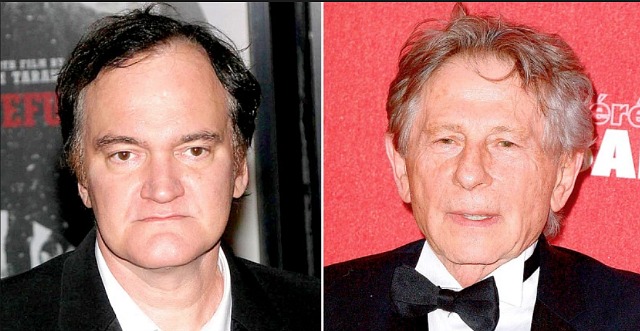
Quivers: [the sex wasn’t consensual.]
QT: “No, that was not the case at all. She wanted to have it and dated the guy.”
Quivers: “She was 13!”
QT: “And by the way, we’re talking about America’s morals, we’re not talking about the morals in Europe and everything.”
Stern: “Wait a minute. If you have sex with a 13-year-old girl and you’re a grown man, you know that that’s wrong.”
QT: “Look, she was down with this. She’s talked about it since, ‘No, he didn’t really do anything to me. It was a technicality for being 13.’”
On The Other Hand…
We all feel good and fortified when lights are flashing and guys like Scott Feinberg are hovering and things are going well, but award-season contenders are obliged to be so relentlessly and buoyantly alpha that they must be going crazy inside. Is there some kind of secret award-season detox-therapy center that contenders can go to, a place where they can drink beer and behave like drunken sailors or at least in a borderline rude way, venting hostility and insulting their peers and/or their least-favorite red-carpet interviewers? I for one get headaches after alpha-vibing for more than an hour.
Greta Gerwig on writing @LadyBirdMovie: "If you stop any woman on the street and say, 'How's your relationship with your mother?' It's never going to be a one sentence response … it's a big, complicated thing." #NomineesNight pic.twitter.com/2aEnLBI8lh
— Hollywood Reporter (@THR) February 6, 2018
Lady Bird, Lady Bird, Lady Bird
Lady Bird is real-deal naturalism, a kind of 400 Blows-level vision of mother-daughter sturm und drang. Unfettered American heartland realism, no bullshit, perfectly performed, edgy but open-hearted, unsullied by magical realism, no script problems to speak of, and beautifully shot with blue-ish, stressed, film-like colors.
Why are you undecided, Academy? Is this or this is not The Year of the Woman? This is your default, your compromise, the movie you’ll proudly stand by five or 20 years hence. A little local movie that is actually “big” in a kind of Delbert Mann Marty sense — a movie that tells the truth, owns its own turf, doesn’t play games.
Quentin’s Recollection
Not too many hours ago Quentin Tarantinogot in touch with Deadline‘s Michael Fleming to discuss the Uma Thurman car crash incident on the set of Kill Bill, as passed along in a 2.3 article by the N.Y. Times‘ Maureen Dowd.
The article’s implication was that Tarantino had strong-armed Thurman into performing an unsafe driving stunt and thereby caused her much grief and pain. Except it wasn’t that simple, Tarantino explains in the transcript. He made a mistake, he says, by reversing the direction of the shot but without test-driving it himself. He knew Thurman “was a shaky driver, but she had a license,” he says. The stunt was “a little thing” but he fucked up all the same. Ever since, he says, he’s been upset and sorry that he allowed it to happen.
Here’s a key portion of what QT told Fleming:
“Watching [Uma] fight for the wheel…remembering me hammering about how it was safe and she could do it. Emphasizing that it was a straight road, a straight road…the fact that she believed me, and I literally watched this little S curve pop up. And it spins her like a top. It was heartbreaking. Beyond one of the biggest regrets of my career, it is one of the biggest regrets of my life. For a myriad of reasons.
“It affected me and Uma for the next two to three years. It wasn’t like we didn’t talk. But a trust was broken. A trust broken over a year of shooting, of us doing really gnarly stuff. Doing really big stunt stuff. I wanted her to do as much as possible and we were trying to take care of her and we pulled it off. She didn’t get hurt. And then the last four days, in what we thought would be a simple driving shot, almost kills her.
Blip on Eastwood Radar Screen
A friend who’s seen Clint Eastwood‘s The 15:17 to Paris (Warner Bros., 2.9) says it’s nothing to write home about. A brief episode inflated into an okay but no-great-shakes 94-minute film. Padding, back-story and whatnot. Starring the real-life Thalys train hero guys — Anthony Sadler, Alek Skarlatos and Spencer Stone, and costarring Judy Greer and Jenna Fischer.
The all-media screening is on Wednesday night, at more or less the same time as Universal’s Fifty Shades Freed screening.
Dorothy Blyskal‘s screenplay is based on “The 15:17 to Paris: The True Story of a Terrorist, a Train, and Three American Soldiers” by Jeffrey Stern, Stone, Sadler and Skarlatos. Judy Greer and Jenna Fischer costar.



